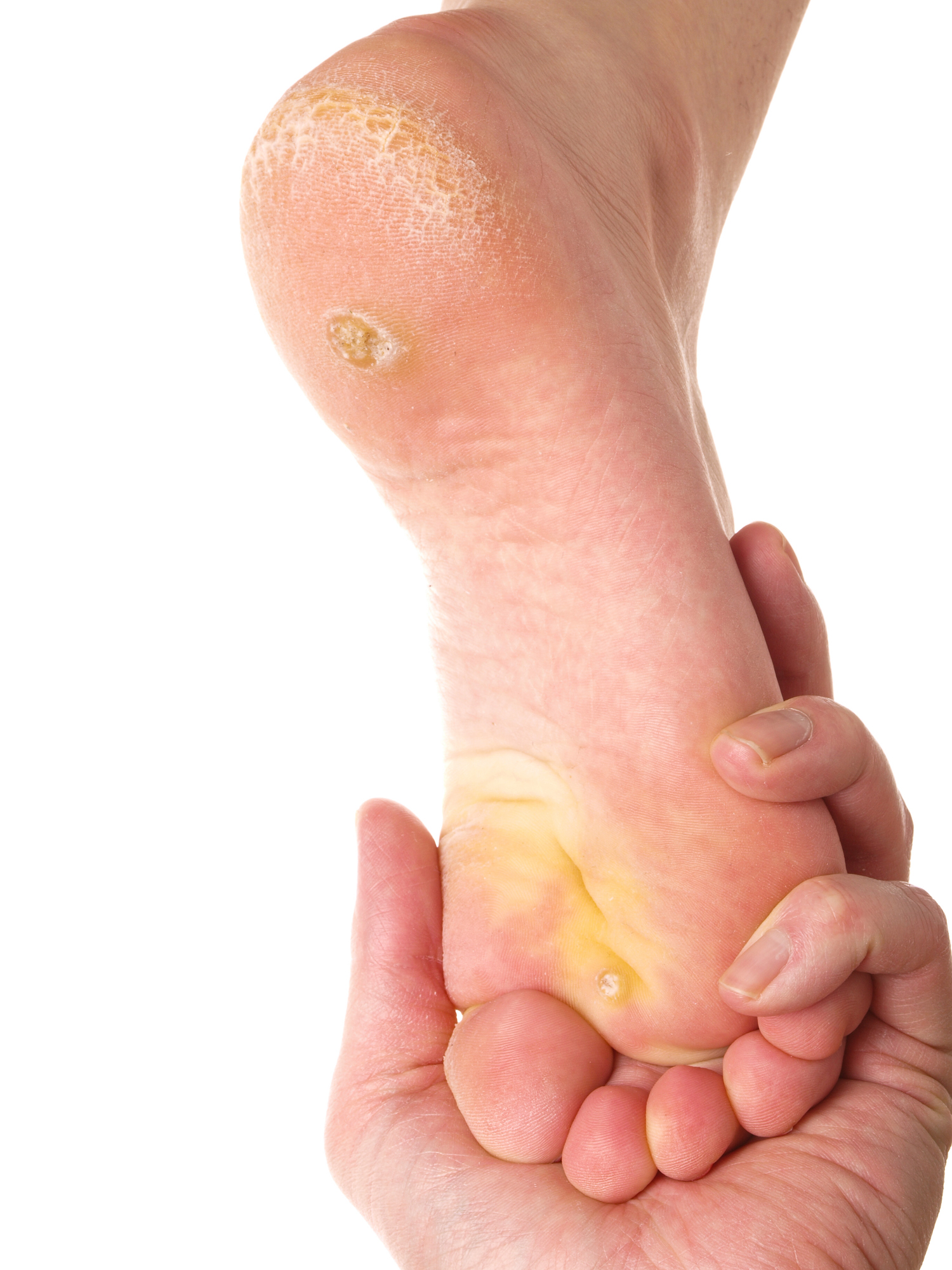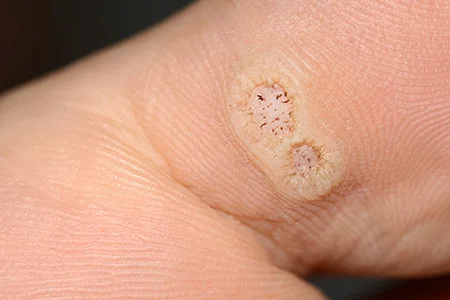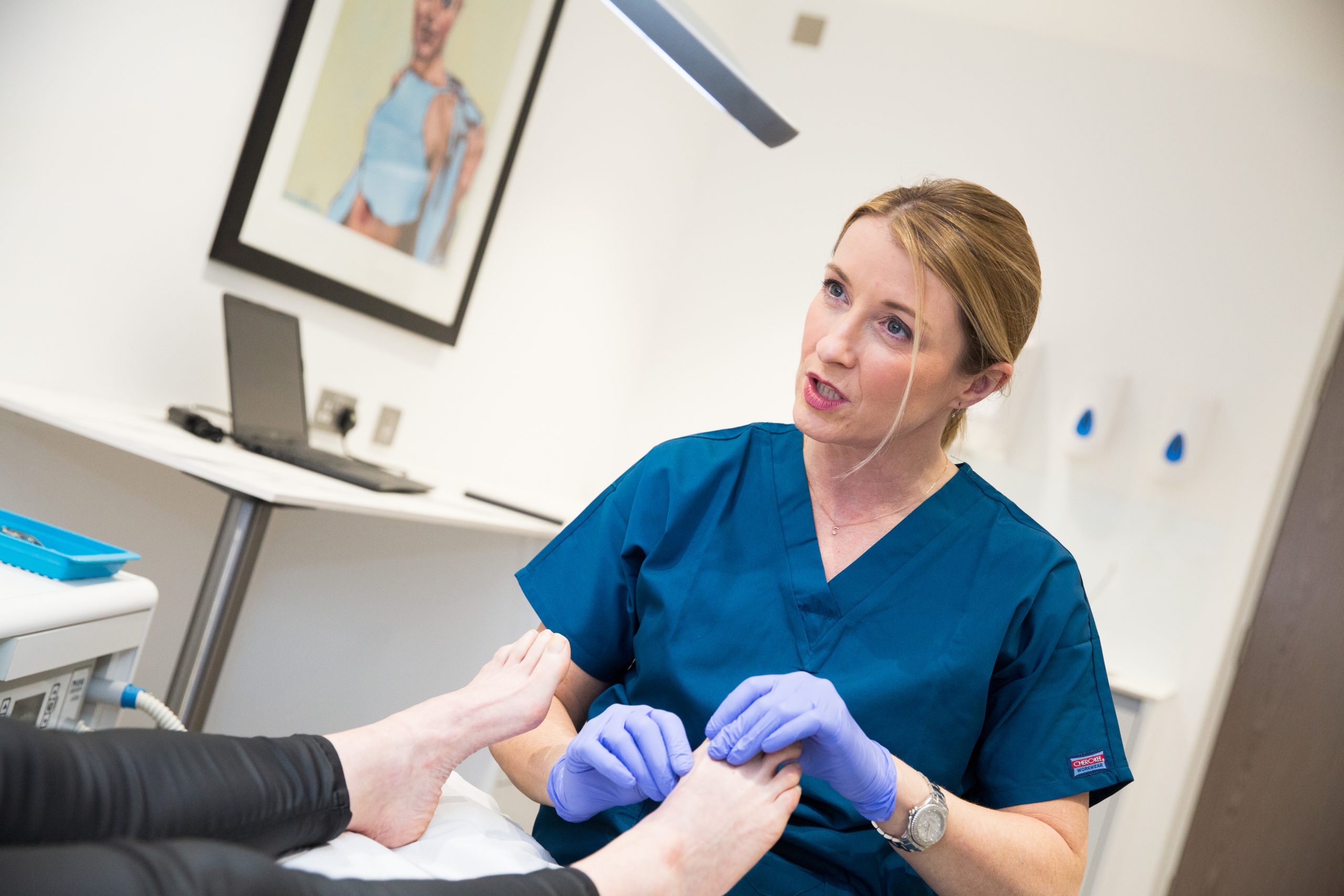Cheshire Foot Clinic
We Specialise in Treating Verruca at Cheshire Foot Clinic
Do you have a painful verruca? Whether you’re the parent or the patient, the team at Cheshire Foot Clinic in Knutsford can help you manage it. Verrucae, which are typically challenging to treat, are a common foot problem that can affect anyone. Relief is available. Our podiatrists will tailor care to your needs. We specialise in diagnosing and treating verrucae effectively to get our patients back on their feet, pain-free. Discover some of the common symptoms and causes of verrucae below, and then call us to learn how our professional treatment options can work for you.
What Is a Verruca?
A verruca is a type of wart that forms on the soles of the feet. Verrucae are caused by the human papillomavirus (HPV), which enters the skin through small breaks, cuts, or abrasions. Unlike warts that appear on other areas of the body, verrucae are often subjected to pressure from standing or walking. This force causes them to develop overlying hard skin, and sometimes they can be painful. These stubborn growths may appear individually or in clusters, which are called “mosaic warts.”

Identifying Verruca Symptoms
It’s important to address verrucae early to prevent them from worsening. To do that, you must be able to identify verrucae. Look for these common signs and symptoms:
- A flat, hard growth – often with a rough surface – on the sole of the foot
- Tiny black dots in the centre of the growth, which represent trapped blood vessels
- Pain or tenderness when walking, standing, or applying pressure
- A small, hardened area of skin surrounded by soft tissue

Causes of Verrucae
Verrucae develop when the HPV virus penetrates your protective skin barrier, usually through cuts, scrapes or microscopic abrasions. The virus thrives in moist, warm environments, such as swimming pools, locker rooms, and communal showers, making these areas common sources of infection. As a result, athletes, swimmers, and gym-goers are particularly susceptible to the virus and, ultimately, verrucae.
Risk Factors for Verruca Development
People of all ages can develop verrucae, but some are at a higher risk. Among them are:
- Children and teenagers, as their immune systems are still developing
- Athletes and swimmers because exposure to damp environments increases risk
- Adults with weakened immune systems, such as the elderly or those undergoing medical treatments like chemotherapy
- Those who frequent shared public spaces like leisure centres and community pools

Our Team Diagnoses Verruca in Cheshire
If you suspect a verruca but aren’t sure, seek a verruca diagnosis from a Health Care Professions Council (HCPC) registered podiatrist. The team at Cheshire Foot Clinic will carefully examine your affected area to identify if the growth is a verruca or another type of lesion. Our experts will also assess the severity of your condition before determining a treatment plan. Factors we’ll consider include your pain level and how long the issue has been present.
Home Remedies for Verrucae
Before opting for professional treatment, some people try home remedies to manage minor verrucae. These include over-the-counter salicylic acid solutions – which help remove the wart’s hard outer layer – and applying duct tape to suffocate the virus. Another method involves soaking the foot in warm water and gently filing the verruca with a pumice stone to manage discomfort. While these approaches may help in mild cases, they may also lead to spreading of the verrucae or damage to healthy skin. Stubborn or painful verrucae require professional attention for effective removal.

Professional Verruca Treatment Options
Cheshire Foot Clinic offers several advanced methods to treat verrucae effectively. We’ll help you decide on which is the most suitable option based on your needs and views. Our verruca treatments include:
- Leave it Alone! – If your verruca is not spreading or painful you could choose to do nothing.
- SWIFT Therapy – Our team specialises in this cutting-edge microwave treatment that stimulates the body’s immune response to combat the virus.
- Verruca Needling or Faulkner’s Procedure – A local anaesthetic is used to numb the area, and the verrucae is punctured at depth to encourage an immune response.
Both treatments we offer have the best medical evidence to support their use.
Resolution and Recovery Times Following Verruca Treatment
Resolution and recovery times will vary depending on the severity of your verruca and your chosen treatment method. Swift microwave therapy has no down time after treatment and treatment is repeated every 6 weeks for up to 6 applications. Verruca Needling typically require a few days to a week for complete recovery and may be repeated 8 weeks after the first treatment if the verruca has not resolved. Regardless, our expert team will guide you through proper aftercare to ensure a smooth recovery and prevent the recurrence of verrucae.
Contact Our Verruca Specialists Today
Don’t let painful verrucae keep you from doing the things you love. Cheshire Foot Clinic is here to help patients in Knutsford and surrounding communities maintain peak foot health, so contact us today to Book an Appointment.
Chat to us and tell us more about your verruca problem or download a copy of our leaflet:
Verruca: Finding Out More and Treatment Options